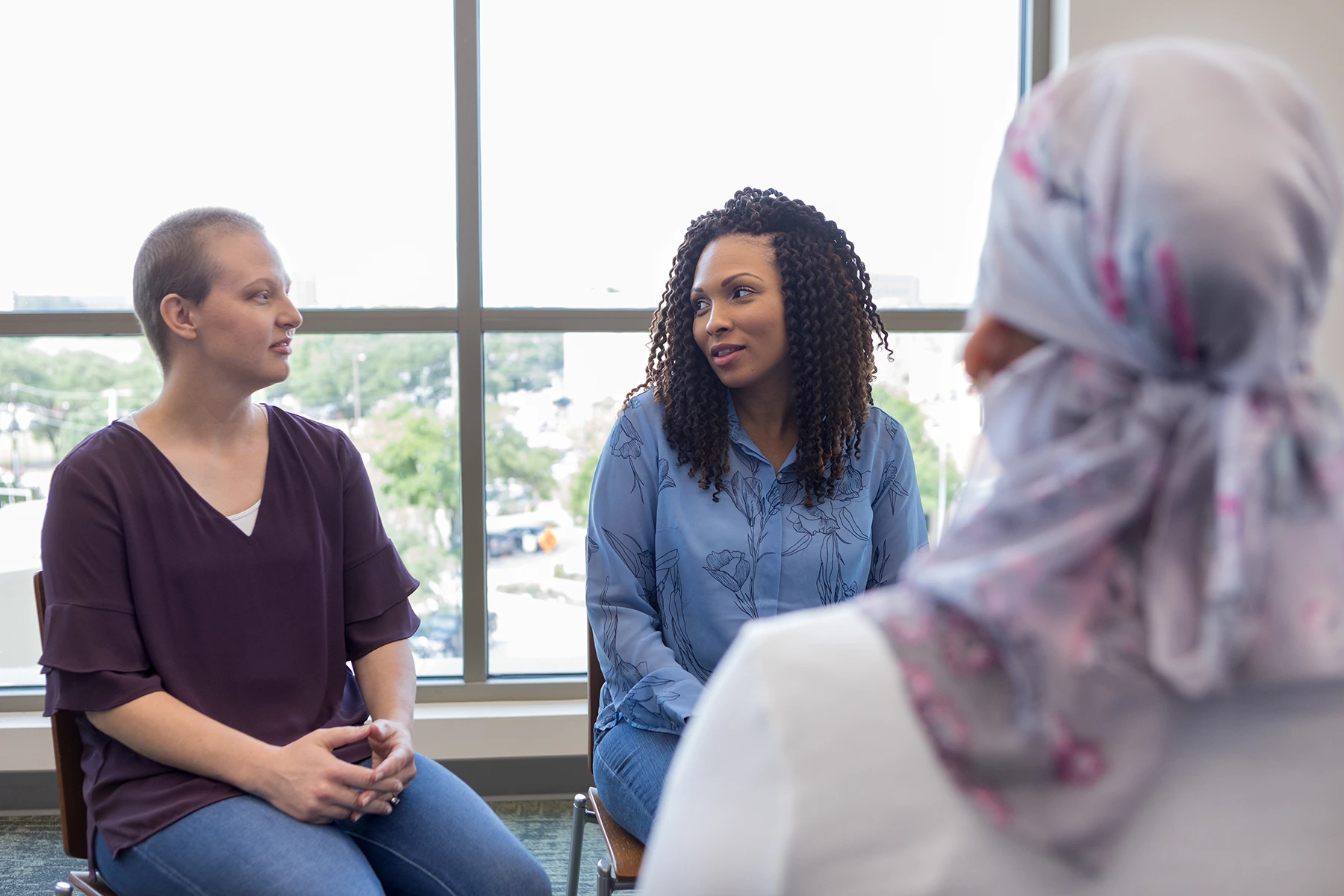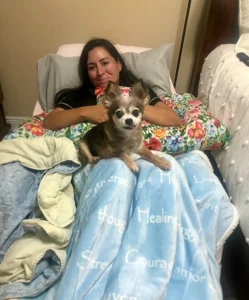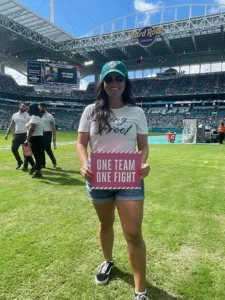Know Your Cancer Risk, And Find Your Community

36-year-old breast cancer survivor Brittany Malo offers advice to young patients at risk for, or diagnosed with, cancer.

When you receive a cancer diagnosis, your life changes in ways you likely never anticipated. But when you’re young, the changes can be even more radical.
Malo, a patient at Sylvester Comprehensive Cancer Center, part of UHealth – the University of Miami Health System, knows about these changes firsthand. She was diagnosed with cancer as a young adult. Now, on the other side of treatment, she has advice for young people facing similar situations.
The importance of early testing
Malo was 31 when her mother was diagnosed with aggressive triple-negative breast cancer. Her mother’s oncologist urged her to make sure her children underwent genetic testing.
Malo’s test revealed a TP53 genetic mutation, also known as Li-Fraumeni syndrome, that put her at high risk for multiple cancers. Her doctors recommended that she follow up with a hematologist and have a baseline mammogram.
However, the mammogram, which was supposed to establish a norm for future testing, showed a suspicious area. It turned out to be cancer. Luckily, the tumor was stage 1A, an early-stage cancer.
“I definitely want to emphasize the importance of early detection and genetic testing. I love to educate anyone who will listen to me about that,” Malo says.
As part of her treatment, Malo had a bilateral mastectomy, multiple reconstruction surgeries, a year of immunotherapy, and IVF to harvest her eggs. Even now, after treatment is complete, her life is still full of doctors and appointments.
“I have a whole team of doctors because of my genetic mutation: I have a breast oncologist, a sarcoma oncologist, a gastroenterologist, a hematologist and a geneticist — and I have to see them all at least every six months,” she says.
Taking charge of recovery
Having cancer at such a young age changed a lot about how Malo approaches life and the way she manages her health.

For one thing, she’s prioritized physical and mental well-being.
“I don’t take life for granted anymore. I say yes when I want to say yes, and I say no when I want to say no. If there’s something I feel I’m doing just to make other people happy, but it doesn’t make me happy, I don’t do it, and I don’t feel bad about it,” she says.
For those with a cancer diagnosis, Malo recommends establishing care with a mental health counselor early on. She had a therapist from the beginning who helped her with body image and other issues.
“I think everyone, but especially people at this age who have been diagnosed with cancer, needs to go to mental health therapy and prioritize that, because mental health is just as important as physical health. Therapy helps me deal with health issues, but also the things that life throws at me other than cancer,” she says.
Malo also recommends that cancer patients learn to get comfortable advocating for themselves, which she had to do in the process of breast reconstruction surgery.
“I would emphasize that if you’re not happy with a recommendation, or with the outcome, there are many surgeons out there with different talents, and it’s your right as a patient to get as many consultations as you need until you find the right surgeon,” she says.
Getting cancer at any age can be expensive; however, younger cancer patients especially need financial advocacy and should advocate for themselves.
“I definitely recommend talking to your hospital about what charity programs they have, and financial aid, because there are programs out there that will help you, and if your hospital can’t help you, they should have resources,” she says. “Or if you do a search online, there are resources specific to adolescent and young adult patients who have cancer.”
Support in the community
Malo’s cancer was diagnosed at the height of the COVID-19 pandemic, which made going through treatment feel incredibly lonely. Finding the right kind of support group was tough at first. Finally, Malo found a fit with an online adolescents and young adults (AYA) group.
She found that she was able to share things with members of the group that she couldn’t share with her friends without cancer, which created a strong bond.
“We’ve maintained this friendship across the country, different walks of life, different occupations,” Malo says. “Maybe they’re someone I wouldn’t typically have been friends with, but we have the cancer in common, and we’re able to relate over that. It’s been really special for me.”
Malo praises Sylvester’s AYA program, which offers monthly get-togethers, wellness programs and other events that highlight different areas of cancer support services.
“I recommend to people, scary as it is, to just rip the Band-Aid off and show up to your first event, because I’ve seen so many people just be transformed by these friendships and knowing they’re not alone. Just show up, because there are other people who want the same thing as you, which is community,” she says.
The support has led Malo to do things she’d never have done pre-cancer. Now she’s on the board for a nonprofit called the Boobie Queen Company, known for its cheekily beautiful bra “crowns.” The organization aims to help bridge the gap between breast cancer treatment and survivorship by addressing some of the mental health challenges associated with breast cancer treatment
“It’s been an important part of my life, and it really fills my cup. It feels good to give back to people who are newly navigating cancer and survivorship,” Malo says.
Of course, it’s not always smooth sailing.
“I mean, if you talk to me around the time when I have my full-body MRI every year, I’m very much not OK,” Malo says. “But for the most part, things are better. I have my community, and I have therapy, and they both help me and give me ways to deal with cancer.”
Written by Jodie Nicotra for Sylvester Comprehensive Cancer Center.
Tags: Adolescent and young adult cancer support, AYA, early detection, Genetic mutation, patient story, Sylvester Comprehensive Cancer Center
